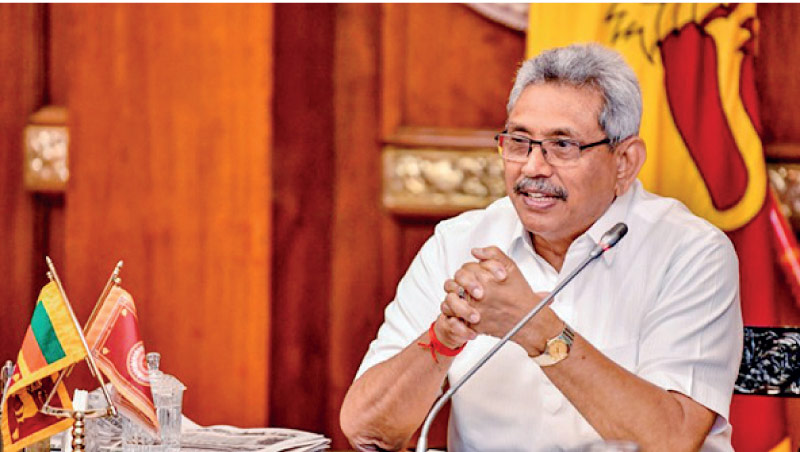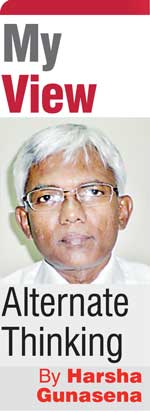Friday Feb 20, 2026
Friday Feb 20, 2026
Tuesday, 22 June 2021 00:07 - - {{hitsCtrl.values.hits}}

Yes, the regime should be ashamed, and they might lose self-respect since an outsider is pointing out to the regime how to protect the basic human rights of Sri Lankan citizens. By doing so the country would get a double benefit, the GSP+ and the human rights of its citizens
 The European Parliament (EP) adopted a resolution on the situation in Sri Lanka on 10 June calling on the Commission and the European External Action Service to use the GSP+ as a leverage to push for advancement on Sri Lanka’s human rights obligations and demand the repeal or replacement of the Prevention of Terrorism Act (PTA), to carefully assess whether there is sufficient reason, as a last resort, to initiate a procedure for the temporary withdrawal of Sri Lanka’s GSP+ status and the benefits that come with it, and to report to Parliament on this matter as soon as possible.
The European Parliament (EP) adopted a resolution on the situation in Sri Lanka on 10 June calling on the Commission and the European External Action Service to use the GSP+ as a leverage to push for advancement on Sri Lanka’s human rights obligations and demand the repeal or replacement of the Prevention of Terrorism Act (PTA), to carefully assess whether there is sufficient reason, as a last resort, to initiate a procedure for the temporary withdrawal of Sri Lanka’s GSP+ status and the benefits that come with it, and to report to Parliament on this matter as soon as possible.
Although the content of the resolution was stronger than the motion which was placed on 8 June, the situation is not that grave as claimed by many since the outcome expected by EP is mild. However, this resolution should be read along with a point mentioned in the body of it that it expresses concern about the growing role and interference of China in Sri Lanka which has nothing to do with the GSP+ scheme and the communique of NATO on 14 June which confronted military ambitions of China for the first time, saying Beijing presents ‘systemic challenges’ for the transatlantic security alliance.
Considering the situation during the Trump era that Europe was eager to engage in business transactions with China and also with Russia, it can be concluded that the communique of NATO was a result of the influence of the US President Joe Biden. This shows the narrowness of the America First policy of Donald Trump which focused merely on the trade deficit of the US and the broadness of Joe Biden’s ‘US is back’ policy which focused on strategic alliance of the allies of the US against China with the intention of broadening it to the democratic states worldwide which shares the common values.
As commented by political analysts, we are experiencing the early stages of a new cold war between China and Russia on one side and the US-led democratic alliance on the other side. During the previous cold war, Sri Lanka adopted a non-aligned foreign policy and the current regime of Sri Lanka is dragging the country towards China which will be harmful to the people of the country. The bilateral relationship of Sri Lanka with China which is a long-time friend of Sri Lanka would also be affected by Sri Lanka trying to be an ally of China since the latter relationship would be vulnerable with the force of the rival block.
The move of the European Parliament should be looked at in this background. The assistance of the European Union (EU) under the scheme of generalised tariff preferences, which applies reduced import duties to certain items of certain countries, is threefold. Firstly, it provides assistance under the general arrangement. Secondly there is a special incentive arrangement for sustainable development and good governance which is called GSP+ and Sri Lanka is benefited under this scheme. Thirdly there is a special arrangement for the least-developed countries called Everything But Arms.
GSP+ was granted to Sri Lanka in 2005 to support the Tsunami-affected economy. The EU in return expected that Sri Lanka would honour 27 international conventions on human and labour rights, environmental protection and good governance which were ratified by Sri Lanka. The EU had withdrawn this facility in 2010 on the grounds that Sri Lanka had not honoured three conventions, International Covenant on Civil and Political Rights, Convention against Torture and other Cruel, Inhuman or Degrading Treatment or Punishment and Convention on the Rights of the Child. The EU readmitted Sri Lanka to the GSP+ scheme in 2017 due to the initiatives taken by the previous government.
The intention of the EU is innocent. They grant concessionary tariff to their market to the deserved countries which comply with the 27 international conventions to which these countries are parties as members of the United Nations. These international conventions represent the values, the EU is adhering. If Sri Lanka is not willing to adhere to these conventions Sri Lanka can, not only leave the GSP+ scheme but also the United Nations.
Therefore, Sri Lankans should not think that the EU by this resolution is interfering with the internal matters of Sri Lanka. They have just pointed out the instances where Sri Lanka has deviated from the agreed norms, and it is their right to do so. However, they have stepped outside of the mandate when they mentioned the Chinese influence.
In this resolution it is noteworthy to point out that they have named Shani Abeysekara, Hejaaz Hizbullah and Ahnaf Jazeem as victims of non-compliance of those conventions by the present Government.
These examples show two basic streams where the autocratic power is exercised by the present regime. The first and foremost is to save themselves from the judicial proceedings against them. In this direction they have appointed a commission to investigate political victimisation which was a Kekille commission headed by a former Supreme Court judge, and it was a disgrace to Supreme Court to be associated with such a person. In democratic countries right from the US it was reported of happening certain deviations from the accepted rules.
However, this was a blatant violation of all democratic norms and I believe that it was the most extreme example one can cite against the natural justice and rule of law. Shani Abeysekara was arrested to punish him since he was the investigator of most of these cases.
The second is to victimise ethnic and religious minorities where Hejaaz Hizbullah and Ahnaf Jazeem fit in. Shakthika Sathkumara who was released later without any punishment also came into this category. All of them were detained under PTA.
Ethnocentrism and religiocentrism were the main causes that brought votes to the present regime at last two elections. In this respect the President shows his intentions very openly. After becoming the President, he has never met TNA. The first meeting with TNA scheduled on 16 June about constitutional reforms was postponed indefinitely. The regime wants to safeguard this ‘values’ and the associated vote base which goes against the values of the EU, the West and for that matter against the entire civilised world. This friction drives Sri Lanka towards China and Russia, two authoritarian regimes who do not care for those values. The Government is of the view that China is the rising star and would be the most powerful superpower of the world in time to come so that it would be beneficial to be an ally of China.
This is happening in the economic arena as well. The Government, when they came into power, slashed the taxes with the blessings of the private sector which were imposed by the previous regime to consolidate the fiscal structure. Affected by corona as well the country is having a high budget deficit. The Government does not want to go to IMF which will certainly impose conditions which will be beneficial to the country in the long run.
When Greece was in similar difficulties few years back both IMF and EU supported Greece with strong conditions. As a result, now Greece was able to reduce the budget deficit and the current account deficit. Sri Lanka also will have to go in this path if it wants to get out of this tragic economic situation. Instead, the Government increasingly relying on the other avenues of financing including currency swaps and Chinese loans which will postpone and may prolong the adverse effects.
The path taken by Sri Lanka to lean towards China politically and economically is challenged by the US, EU and NATO. More importantly India who dared to invade our air space in the 1980s during the time of the cold war is with the West and is a member of the Quad, an alliance of the US, Japan, Australia and India against China. President Jayewardene had only one remark to make when the Indian planes dropped humanitarian aid in Jaffna. He said all Sri Lankans are prepared to die facing the enemy in the event of an invasion.
In 1980s President Jayewardene was perceived to be aligned with the US and India was in the opposite block. After the incident he was asked by the US to settle the matters with India. During the cold war Sri Lanka managed well when the foreign policy was perceived to be non-aligned especially during the time of Prime Minister Sirimavo Bandaranaike.
The President is fond of learning and probably applying here the governing methods of the Communist Party of China. In 1971 North Korean Mission in Sri Lanka was closed on suspicion of involving in an uncovered plot to overthrow the government.
All the problems are interwoven. Around 60% of the exports of Sri Lanka are to the EU, the UK and North America. The US is the biggest importer of our goods amounting to 25% of our total exports. The problem should be viewed in this light.
The actions we have to take to safeguard the GSP+ scheme are the actions safeguarding the basic human rights of the citizens of Sri Lanka. Those are a drawback for an autocratic regime. Therefore, those actions have nothing to do with the sovereignty of Sri Lanka which is vested with the people and not with the leaders. Yes, the regime should be ashamed, and they might lose self-respect since an outsider is pointing out to the regime how to protect the basic human rights of Sri Lankan citizens. By doing so the country would get a double benefit, the GSP+ and the human rights of its citizens.